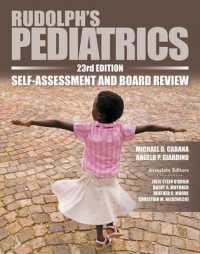Full Description
This book considers the global response on governance after the pandemic while sociologically addressing the effects of COVID-19 on life and work experience.
It presents the effects of COVID-19 on global and local labour markets, the development of digitisation and technology, of work health, and on the environment with respect to global warming and climate change. Linking COVID-19 to the progress of globalisation, the book considers the spread of the pandemic and its management as a response to neoliberalism.
The book analyses national and international governance models for tackling future outcomes of emerging global issues such as technology, green industry and environment that may inform future management of global crises. As such, it will be of interest to scholars in the field of Global Studies, Governance, International Relations, Political Science, Complexity Studies, Environment Studies, Sociology, Disaster Management and Occupational Health.
Contents
I Introduction
1. Society and its institutions prior to COVID-19
2. Globalisation and sociological contributions: The impact of COVID-19
3. Neoliberalism in a new order
II Specific effects of COVID-19
4. COVID 19 and Globalisation: The reconstitution of the global world
5. The impact of COVID-19 on national and global health and safety at work (OHS)
6. Effects of the COVID-19 pandemic on work, technology and social relations
7. The growth of digitisation, metrics and automation
8. Implications for the world of the management of COVID-19
III Changing impact on Globalisation due to COVID-19
9. COVID-19 and Climate Change
10. Growth of the green industry, labour and the labour process
11. Changes in local, national, and global labour markets
12. Gender, COVID-19 and changing Globalisation
13. Labour process and socio-political contexts: A view to the future








